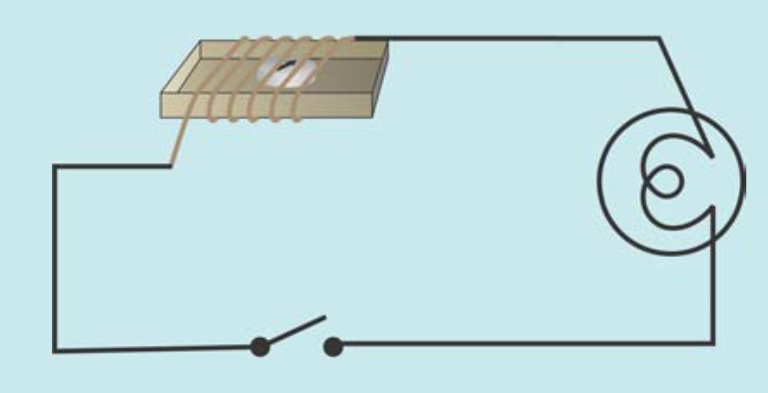Chapter 14 - Electric Current and it Effects
Question and Answers
Question 1: Draw in your notebook the symbols to represent the following components of electrical circuits: connecting wires, switch in the ‘OFF’ position, bulb, cell, switch in the ‘ON’ position, and battery
Answer:

Question 2: Draw the circuit diagram to represent the circuit shown in Fig.14.21.

Answer:

Question 3: Fig.14.22 shows four cells fixed on a board. Draw lines to indicate how you will connect their terminals with wires to make a battery of four cells.

Answer:

Question 4: The bulb in the circuit shown in Fig.14.23 does not glow. Can you identify the problem? Make necessary changes in the circuit to make the bulb glow.

The - terminal should be connected to + terminal of cell.

Question 5: Name any two effects of electric current.
Answer:
i) Heating effect of electric current
ii) Magnetic effect of electric current
Question 6: When the current is switched on through a wire, a compass needle kept nearby gets deflected from its north-south position. Explain.
Answer: When the current is switched on through a wire, magnetic field is created around it hence we see deflection in the compass needle kept nearby.
Question 7: Will the compass needle show deflection when the switch in the circuit shown by Fig.14.24 is closed?

Answer: No, compass needle does not show deflection when the circuit is a closed, magnetic field is not created until current is flowing through the circuit.
Question 8: Fill in the blanks:
(a) Longer line in the symbol for a cell represents its positive terminal.
(b) The combination of two or more cells is called a battery.
(c) When current is switched ‘on’ in a room heater, it produces heat.
(d) The safety device based on the heating effect of electric current is called a fuse.
Question 9: Mark ‘T’ if the statement is true and ‘F’ if it is false:
(a) To make a battery of two cells, the negative terminal of one cell is connected to the negative terminal of the other cell. (False)
(b) When the electric current through the fuse exceeds a certain limit, the fuse wire melts and breaks. (True)
(c) An electromagnet does not attract a piece of iron. (False)
(d) An electric bell has an electromagnet. (True)
Question 10: Do you think an electromagnet can be used for separating plastic bags from a garbage heap? Explain.
Answer: No, because plastic does not have magnetic property to get attracted to a magnet hence magnet cannot be used to separate plastic bags.
Question 11: An electrician is carrying out some repairs in your house. He wants to replace a fuse by a piece of wire. Would you agree? Give reasons for your response.
Answer: It is not a wise idea to replace fuse by a piece of wire, as it has very low melting point. In case of metal piece, melting point will be high and the circuit will be intact in case there is overload or overheat.
Question 12: Zubeda made an electric circuit using a cell holder shown in Fig. 14.4, a switch and a bulb. When she put the switch in the ‘ON’ position, the bulb did not glow. Help Zubeda in identifying the possible defects in the circuit.

Answer:
i) The connecting wire may be loose
ii) The electric cell may be used up
iii) Switch may not be functioning well
iv) Cell power has been exhausted
Question 13: In the circuit shown in Fig. 14.25

(i) Would any of the bulb glow when the switch is in the ‘OFF’ position?
Answer:
No, the bulb will not glow as the circuit is not complete when the switch is off.
(ii) What will be the order in which the bulbs A, B and C will glow when the switch is moved to the ‘ON’ position?
Answer: If the switch is on, all the bulbs glow simultaneously.
No comments:
Post a Comment